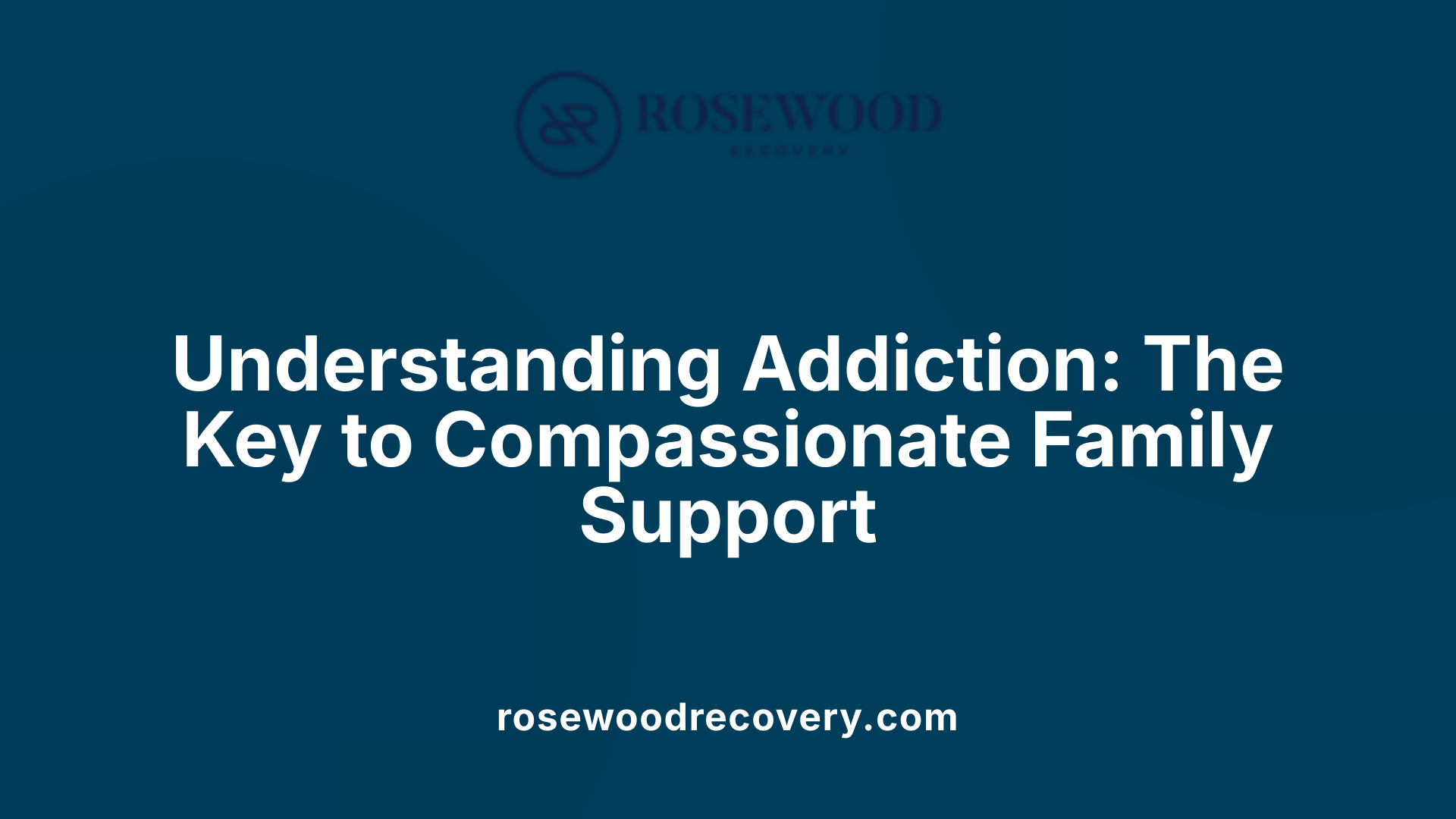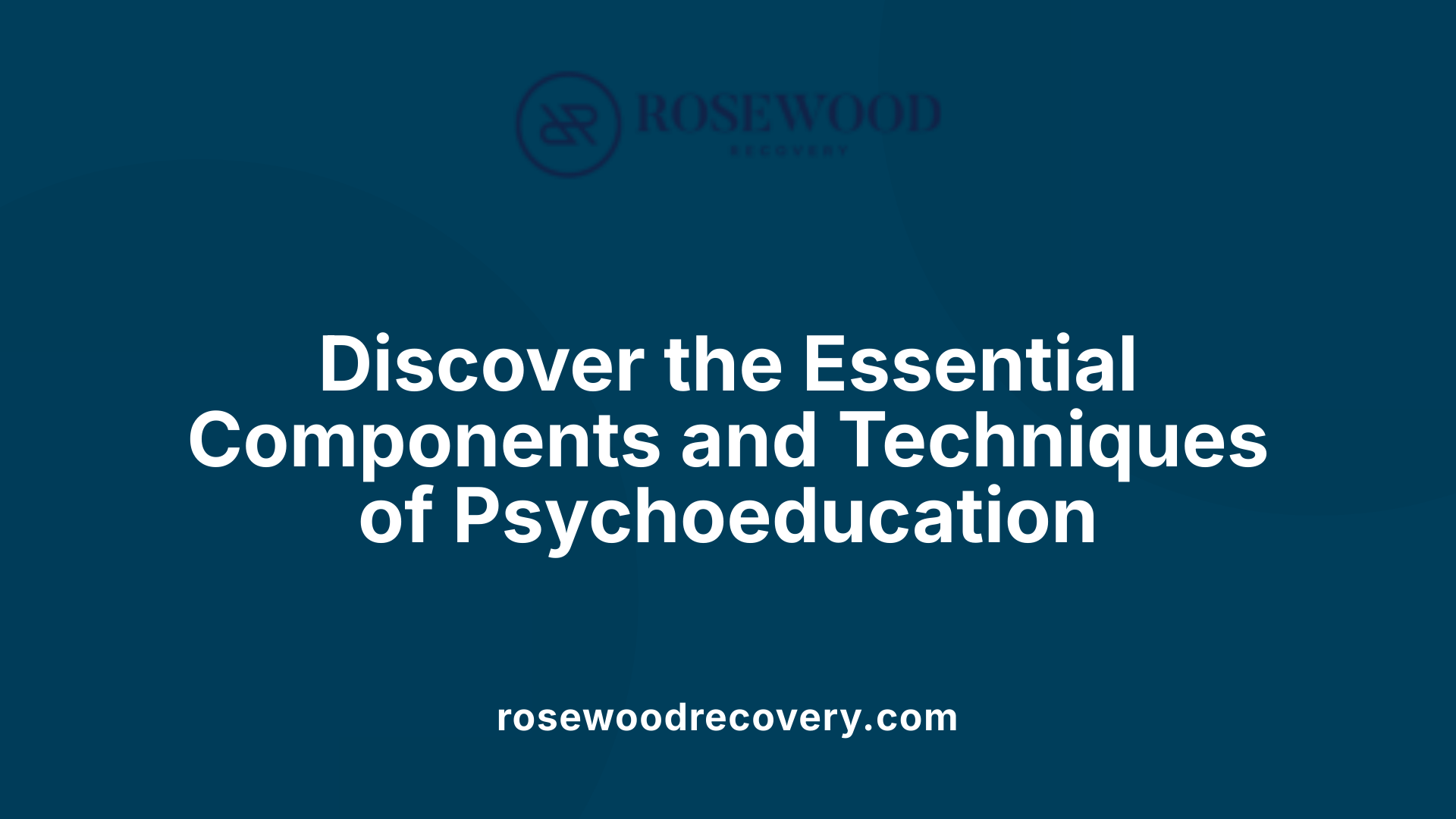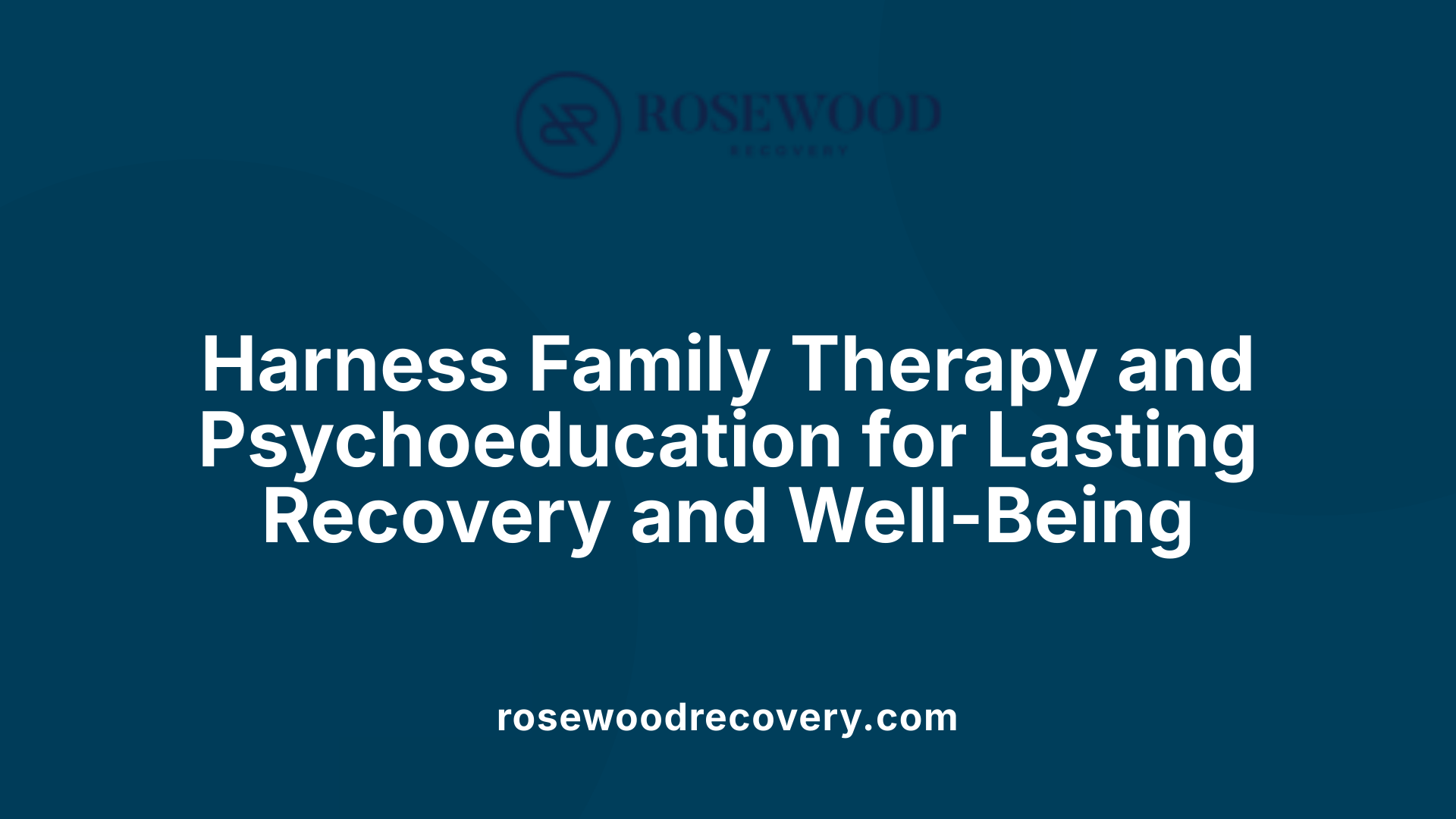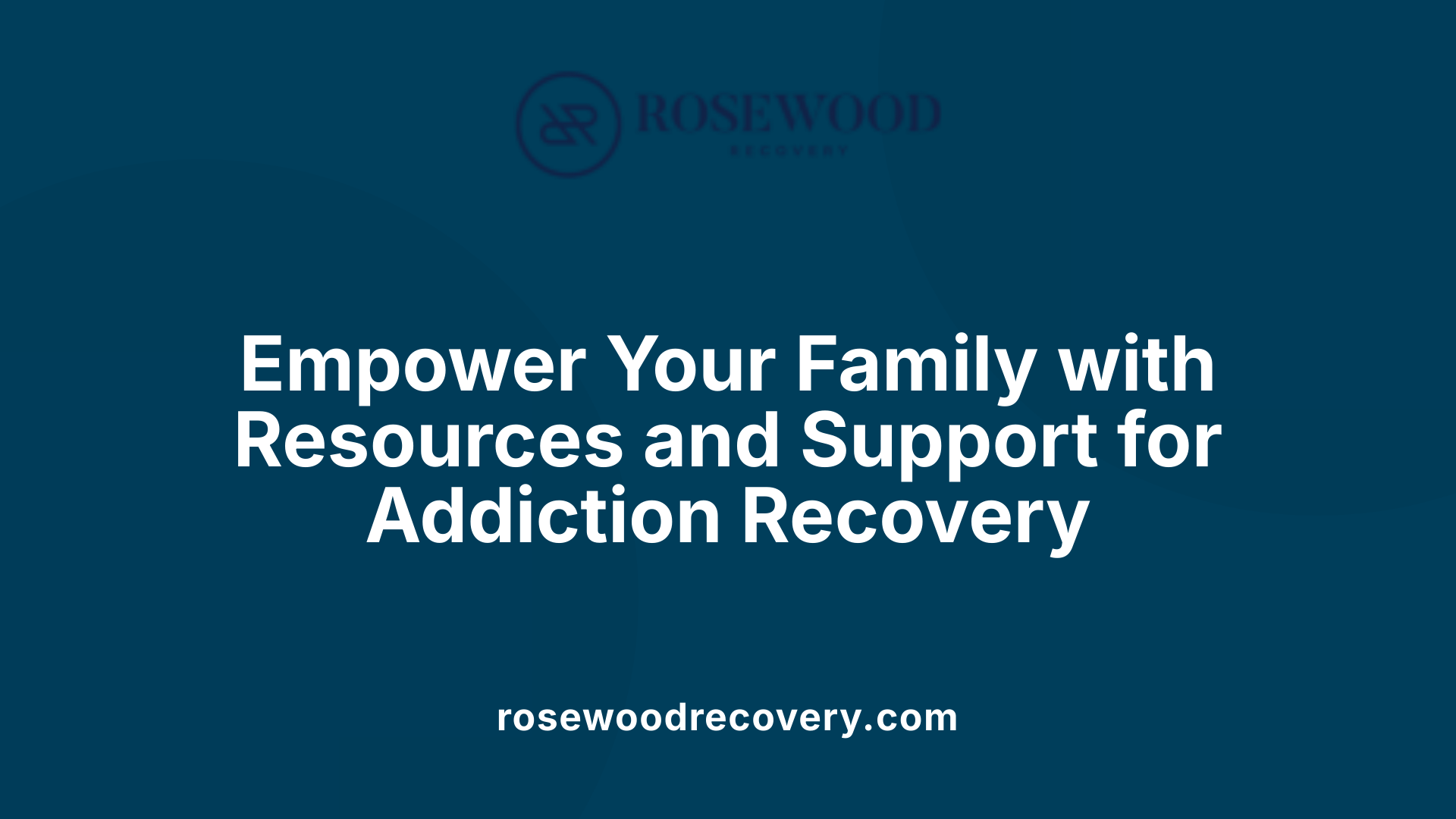Understanding the Critical Role of Psychoeducation in Family Support for Addiction
Addiction is often described as a 'family disease' because of its profound impact on relationships and family dynamics. Effective recovery not only depends on individual treatment but also heavily relies on the active involvement of family members. Psychoeducation emerges as a pivotal component in equipping families with the knowledge and skills necessary to support their loved ones through recovery. This article explores the multifaceted benefits of psychoeducation, its core components and methods, and how it facilitates better communication, healthier relationships, and sustained sobriety.
The Significance of Psychoeducation in Supporting Families of Addicts

What is the importance of psychoeducation for families of individuals with addiction?
Psychoeducation plays a vital role in helping families understand the intricate nature of substance use disorders. It offers essential insights into how addiction affects the brain, behavior, and family dynamics. When families are informed about addiction as a chronic disease involving biological, psychological, and social factors, they gain a clearer perspective on their loved one’s struggles.
Providing families with knowledge about addiction fosters better communication and strengthens relationships. It enables family members to recognize the early signs of relapse and understand the importance of ongoing support. This understanding encourages healthier interactions, reduces blame, and mitigates feelings of guilt, shame, or stigma often associated with addiction.
Engaging families through psychoeducation boosts their involvement in treatment plans. Research indicates that families who are well-informed are more likely to participate actively, resulting in improved treatment engagement and retention. This increased involvement is associated with better recovery outcomes, as a supportive family environment can help prevent setbacks.
Additionally, psychoeducation addresses problematic family behaviors such as enabling or codependency. It helps set healthy boundaries and promotes recovery-oriented family dynamics. Implementing family counseling sessions, which incorporate psychoeducation, fosters emotional resilience and helps families develop effective coping strategies.
Ultimately, psychoeducation empowers families by equipping them with tools to support their loved ones’ recovery journey. It enables families to create a safe, supportive environment conducive to long-term sobriety. This holistic approach enhances not only the individual’s treatment success but also the overall well-being of the entire family unit.
In summary, psychoeducation is essential for fostering understanding, improving communication, reducing stigma, and increasing the likelihood of sustained recovery for individuals with addiction, reinforcing the importance of family involvement at every stage of treatment.
Understanding and Managing Addiction Through Psychoeducational Programs
How do family-based psychoeducational programs assist in understanding and managing addiction?
Family-centered psychoeducational programs play a vital role in helping loved ones comprehend the complex nature of addiction. These programs provide detailed information about the biological, psychological, and social effects of substance use disorders, highlighting how addiction impacts brain chemistry, behavior, and family dynamics. By understanding these aspects, family members can shift from blame to empathy, reducing stigma and fostering a supportive environment.
A core component of these programs is enhancing communication and coping skills. Families learn effective ways to discuss concerns, recognize warning signs, and manage emotional stress related to their loved one's substance use. Skills such as active listening, boundary setting, and problem-solving become integral, promoting healthier relationships and reducing enabling behaviors.
Addressing the family environment is equally important. Psychoeducation explores family dynamics—such as codependency or enabling—that may inadvertently support addictive behaviors. Therapies like family systems therapy help identify and modify these patterns, strengthening the family's resilience.
Active involvement in treatment is encouraged through participation in family therapy sessions, mutual support groups like Al-Anon or Nar-Anon, and skill-building activities. These engagements foster a sense of community and accountability, which are essential for sustained recovery.
By focusing on family strengths and vulnerabilities, psychoeducational programs support long-term management of addiction. They empower families to become active participants in their loved ones' recovery journey, improve relational dynamics, and contribute to better treatment retention and outcomes.
Ultimately, these programs facilitate a comprehensive approach where families are equipped with the knowledge and tools needed to support recovery, manage challenges, and foster hope for a healthier future.
| Aspect | Focus Area | Details |
|---|---|---|
| Understanding Addiction | Biological, Psychological, Social Effects | Explains how addiction affects the brain, behaviors, and social interactions |
| Communication & Coping | Skills Development | Teaches active listening, boundary-setting, emotional regulation |
| Family Dynamics | Enabling Behaviors & Family Patterns | Addresses codependency, promotes healthy relationships |
| Active Participation | Therapy & Support Groups | Family therapy, peer support, community engagement |
| Building Resilience | Support Systems & Long-term Management | Strengthening family bonds, fostering hope, maintaining engagement |
Supporting this approach, research underscores that family involvement improves treatment adherence, reduces relapse rates, and enhances overall well-being. These programs are crucial in transforming family environments into supportive spaces that promote recovery and resilience.
Rebuilding Relationships and Enhancing Family Communication

How does psychoeducation support family communication and help rebuild relationships in the context of addiction?
Psychoeducation plays a crucial role in improving family communication and repairing relationships affected by addiction. When family members understand the biological, psychological, and social effects of substance use, they develop greater empathy and compassion for their loved ones struggling with addiction. Educating families about how addiction impacts brain chemistry and behavior helps reduce blame and misunderstandings, fostering a more supportive environment.
Active listening and honest dialogue are encouraged through psychoeducational sessions, where families learn techniques like 'I' statements and sharing responsibility. These strategies facilitate open communication and reduce defensiveness, making it easier to address sensitive issues and conflicts.
Setting healthy boundaries and avoiding enabling behaviors are vital components emphasized in psychoeducation. Families are taught how to support recovery while protecting their own emotional well-being, which helps prevent codependency and promotes a balanced dynamic.
Implementing effective communication strategies—such as expressing feelings without criticism, clarifying expectations, and validating each other's experiences—further strengthens family bonds. Psychoeducation also highlights the importance of family involvement in therapy, providing a structured forum for resolving conflicts and rebuilding trust.
Throughout this process, families are encouraged to participate in therapy sessions, which can help address underlying issues, resolve past traumas, and develop mutual understanding. These interventions foster relational growth, enhance support networks, and promote a collaborative approach to recovery.
Overall, psychoeducation establishes a foundation of knowledge and skills that supports honest dialogue, emotional safety, and healthier interactions. It helps families move from blame and misunderstanding toward empathy, cooperation, and healing, vital for long-term recovery and strengthened relationships.
Core Components and Methods of Psychoeducation in Addiction Treatment

What are the key components and methods used in psychoeducation for addiction treatment?
Psychoeducation in addiction treatment is a structured approach that provides individuals and families with essential information about substance use disorders. Its goal is to increase understanding, foster engagement, and support recovery.
One fundamental component is education about the biological, psychological, and social aspects of addiction. This includes explaining how drugs and alcohol affect brain chemistry, neurotransmitters like dopamine, and behaviors. By understanding these effects, individuals can better grasp the chronic and treatable nature of addiction.
Another vital element focuses on developing coping strategies. Clients learn how to manage triggers, cravings, stress, and emotional distress through techniques such as emotional regulation, mindfulness, and problem-solving skill-building. These tools help reduce relapse risk and bolster resilience.
Addressing myths and reducing stigma is also a significant part of psychoeducation. This involves debunking misconceptions, promoting the idea that addiction is a disease, and fostering compassionate understanding to encourage treatment seeking.
The effectiveness of psychoeducation heavily relies on interactive and personalized methods. Sessions often involve multimedia tools, storytelling, and experiential activities that make complex information accessible and engaging. Tailoring content to individual backgrounds, culture, and learning styles enhances understanding and motivation.
High-quality psychoeducation employs principles like clear communication, repetition, and a client-centered approach. It aims to empower clients, fostering personal responsibility and informed decision-making.
Group settings are common, where shared experiences foster community, accountability, and mutual learning. Combining psychoeducation with therapies like cognitive-behavioral therapy (CBT) and family involvement creates a comprehensive treatment plan.
Research indicates that this method improves adherence to treatment, lowers rates of relapse and hospitalization, and enhances overall recovery outcomes. It lays a foundation for long-term sobriety by providing ongoing educational support and skill reinforcement.
In summary, the core methods of psychoeducation integrate evidence-based content delivery, interactive engagement, personalization, and the use of multimedia to improve understanding, satisfaction, and recovery success.
Family Therapy and Psychoeducation: Synergistic Tools for Managing Mental Health and Substance Use Disorders

What role does family therapy and psychoeducation play in managing mental health and substance use disorders?
Family therapy combined with psychoeducation serves as a cornerstone in the treatment of mental health issues and substance use disorders (SUDs). These methods actively involve family members, helping them understand the complexities of addiction and mental health struggles. This collaborative approach improves communication, reduces stigma, and creates a supportive environment essential for recovery.
Through psychoeducation, families learn about the biological, psychological, and social factors that contribute to these conditions. They are equipped with knowledge about the effects of substances, mental illnesses, and the importance of ongoing support. Family therapy, on the other hand, provides a structured space to address communication barriers, rebuild trust, and develop healthier interaction patterns.
Addressing co-occurring mental health issues is a vital aspect. Family involvement can help identify underlying trauma, resolve conflicts, and manage triggers that may lead to relapse or worsening mental states. Techniques such as conflict resolution, setting boundaries, and fostering emotional safety are emphasized.
Rebuilding trust and restoring emotional safety are critical steps, especially when addiction has strained relationships. Family therapy facilitates honest conversations, promotes accountability, and encourages empathy. This process can heal wounds, strengthen bonds, and promote resilience within the family system.
Supporting recovery through family involvement enhances motivation and compliance with treatment plans. Educating family members about relapse prevention, coping strategies, and mental health management empowers them to offer effective support and intervene early when warning signs appear.
Integrating psychoeducation with evidence-based family therapies like Multisystemic Therapy (MST), Multi-Dimensional Family Therapy (MDFT), and Functional Family Therapy (FFT) optimizes treatment outcomes. These models focus on viewing the individual and family as interconnected systems, aiming for sustainable behavioral change.
Resources such as SAMHSA’s Helpline and community support groups further strengthen these efforts, providing families with ongoing assistance, education, and peer support networks. Altogether, these strategies foster a comprehensive, family-centered approach that significantly improves the prognosis for individuals with co-occurring disorders.
Providing Resources and Strategies for Families

What are some educational resources and strategies available to families dealing with addiction issues?
Families facing the challenge of addiction have access to a wide array of helpful resources and strategies to better understand and support their loved ones. Educational materials such as downloadable PDFs, newsletters, and activity guides are readily available through organizations like SAMHSA (Substance Abuse and Mental Health Services Administration) and Hazelden Betty Ford. These tools provide essential information on addiction, recovery processes, and ways to respond effectively.
Support groups like Al-Anon, Nar-Anon, and Families Anonymous are vital sources of mutual support. They offer a platform for families to share experiences, learn coping skills, and build emotional resilience. Participation in these groups can reduce feelings of isolation and shame, fostering a sense of community and hope.
Engaging in family counseling and therapy enhances communication and helps illuminate the complexities of addiction. Therapies such as family systems therapy or strategic family therapy teach skills for healthier interactions and promote a supportive environment for recovery.
Community-based programs and helplines are also valuable. Many local initiatives provide access to treatment options, crisis support, and educational workshops tailored to families' needs. These programs facilitate connections to resources that might otherwise be difficult to find.
Additionally, specialized programs like Beamer’s World and Beamer’s Journey focus on educating children about the realities of addiction and recovery, fostering understanding and resilience within families.
Prioritizing self-care is equally crucial for family members. Taking care of one's mental and physical health ensures they remain strong and capable of supporting their loved ones without experiencing burnout.
Overall, utilizing these educational resources and support strategies equips families with the knowledge and tools necessary to navigate addiction, foster hope, and promote healing within the family unit.
Empowering Families for Long-Term Recovery Success
Psychoeducation for families of addicts is not merely informational; it is a transformative process that fosters understanding, communication, and resilience. By actively participating in psychoeducational programs, families can better understand the biopsychosocial facets of addiction, develop vital coping and communication skills, and create a supportive environment that enhances treatment adherence and reduces relapse risks. Resources such as family therapy, support groups, educational materials, and community programs further reinforce these efforts. When families are well-informed and equipped, they become powerful allies in their loved ones’ recovery journeys, promoting healthier relationships, emotional safety, and long-term sobriety. In essence, psychoeducation empowers families to move from uncertainty and frustration to hope and active engagement, making it an indispensable element in the fight against addiction.
References
- Chapter 3—Family Counseling Approaches - NCBI
- Exploring the Impact of Psychoeducational Programs on Reducing ...
- The Importance of Family Psychoeducation - Walden University
- Psychoeducation For Substance Abuse Treatment - Refine Recovery
- 10 Benefits of Family Therapy for Addiction - My Time Recovery
- Psychoeducation & Skill Development for Relapse Prevention
- (PDF) Psychoeducation impact for family members of substance users
- The principles and practices of psychoeducation with alcohol or ...
- Family Therapy for Addiction Treatment
- Mental Health Coping Resources for Children and Families - SAMHSA




